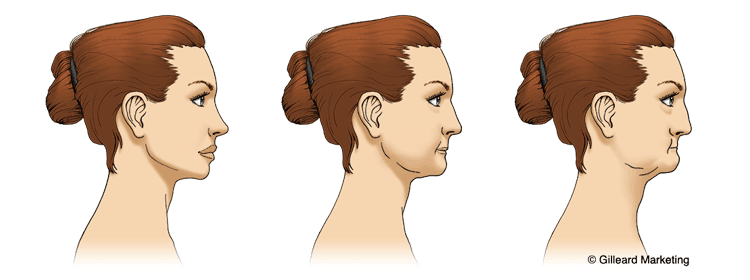Until the development of dental implants, traditional dentures were the only solution for replacing all your teeth. Although they have greatly improved as technology has advanced, there are still some fundamental problems with dentures which cause Dr. Rapoport and Dr. Schuler to not recommend them except as a replacement option of last resort.
Dentures Cause Bone Loss in the Jaw

The jawbone supporting your teeth needs the pressure that comes from regular biting and chewing to maintain its volume and density. When your teeth are missing, the bone continuously dissolves away. When all teeth are missing, the entire dental arch slowly shrinks in height and volume and the lower third of your face progressively “collapses”.
The forces that are exerted on the jaw by traditional dentures accelerate the bone loss and facial collapse. Facial collapse causes your nose and chin to stick out and the distance between them to shrink. It also causes your lips to become thin and excess wrinkles to develop around your mouth and face, making you look much older than you are.
Dentures Have Minimal Chewing Power
Dentures have only about 10% of the chewing power of natural teeth. This makes it very difficult or even impossible to eat many of the foods you need for proper nutrition, unless you use a blender.
Dentures Continually Lose Their Fit
Because of the continuous loss of bone that occurs when wearing traditional dentures, they will continuously lose their fit and have to be adjusted, relined or replaced. This causes them to slip or click and make noise while you are eating or talking. It also leads to denture sores and painful chewing.
Dentures Are Inconvenient
Dentures have to be removed to be cleaned and often have to be taken out while you sleep. They usually need messy adhesives to be secured. On top of this, dentures have a false palate that covers the roof of your mouth and this dulls your sense of taste.
Implant-supported, Fixed-in Dentures Restore Chewing Power and Stability
Dentures can be stabilized somewhat by having them snap onto implants, but the best and most stable option is to place dental implants to support a set of new fixed-in teeth with our All-on-4® New Teeth in One Day procedure.
Click here to learn more about All-on-4® New Teeth in One Day procedure








